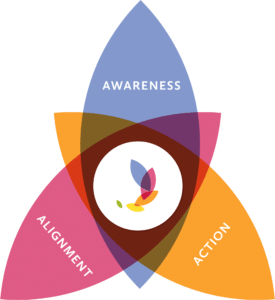
Another distinction between a transformational approach to coaching and a transitional one is how a coaching engagement unfolds. With a transitional approach, goal setting takes place, and the coaching happens in a more or less a linear fashion in service of that goal.
In contrast, the transformational approach is a process where awareness, alignment, and action work together as co-equal catalysts to create energy and momentum around a topic. It involves building an overall understanding of what you want to accomplish, but delves deeply into building awareness around any thoughts and assumptions that you may have about your topic.
We see any questions as an opportunity to explore what you know about the topic. Then, once we build awareness, we examine any shifts in perspective and see how this newfound awareness aligns with your desired outcome. Finally, we begin to set actionable goals around the topic and work through that change together.
The power behind this methodology is that there are many sources of information and inspiration that can help you approach your challenge. Sources like courses, books, and podcasts, so you can learn, synthesize new information, and see what works well for you. Instead of examining answers on a two-dimensional basis, all possibilities are introduced so ultimately you feel empowered to make an informed decision.
It is important to note that a transitional coaching engagement can happen in as little as three sessions because you are simply trying to get from point A to B. Transformational coaching, on the other hand, will take longer. But it has the potential to be much more rewarding because you’re investing in designing an entirely new outlook and outcomes.

 Follow
Follow